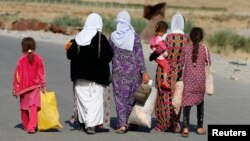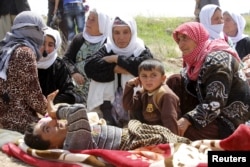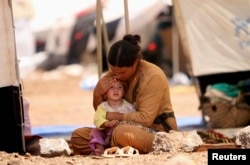Two years after Islamic State militants attacked the Yazidi religious minority in northern Iraq and took thousands of women and girls as sex slaves, many victims are now returning home pregnant or, in some cases, with newborn babies, Iraqi sources tell VOA.
Those victims are faced with contradicting cultural and legal challenges: While the former type of challenge is compelling them to undergo abortions or abandon babies, the latter is criminalizing their actions, those sources say.
According to a Human Rights Watch report, nearly 1,500 Yazidi women and girls enslaved by IS have escaped. However, around 2,000 women remain in captivity.
Nemam Ghafouri, the chairwoman of Joint Help for Kurdistan, a Swedish-Kurdish organization that supports displaced Yazidis, told VOA that "the return of Yazidi female victims can be divided into three phases. In the first phase, we received raped women; in the second phase, we received pregnant women; and in the third phase, now, they are coming home with infants.”
‘Alarming numbers’
According to Ghafouri, the issue of pregnant Yazidi returnees became noticeable to her organization in November 2014, four months after the massive IS attack on Yazidi areas. “Since then, more and more victims have returned home, with some of them eight months pregnant and others nine months," she said.
“Abortion has been used in all cases I have encountered,” she said.
No data are available on how many victims have returned home pregnant or with infants because they, and the officials, hardly talk about the issue publicly to avoid a backlash from a rather conservative Iraqi society.
VOA reached out to several women who sought abortions or gave birth, but no one agreed to talk.
Nofel Hamadi Akub, the governor of IS-controlled Nineveh province, said there were approximately 3,000 newborn children with "unknown parentage" in IS-controlled Sunni areas as a result of "sexual jihad." The number included children born to Iraqi or foreign Sunni women who married IS fighters.
“The most complicated problem facing Baghdad after the liberation of Nineveh will be the issue of children with unknown parentage,” Akub said.
Social stigmatization
A small religious minority concentrated mostly in northern Iraq, Yazidis are an insular group, keeping mostly to themselves despite the often bloody realignments the borders and political structures around them have gone through.
Marrying someone from another religion is an unpardonable sin in the Yazidi religion. Similarly, having sex, even under duress, is considered to taint the bodies and souls of the community members.
Consequently, when the IS militants took captive thousands of Yazidi women and girls as sex slaves and forced them into religious conversion, the female victims found themselves being stigmatized by their communities upon their return.
Nevertheless, in September 2014, the spiritual leader of the Yazidis, Khurto Hajji Ismail, widely known as "Baba Sheikh," called on the community to welcome back the abducted women because they had been "subjected to a matter outside their control."
That statement has since helped the victims rejoin their community, but newborn infants and pregnancy are not tolerated.
“The victims are our daughters and sisters, but it is unacceptable in our religion to allow the birth of any children if both parents are not Yazidis,” Baba Sheikh told VOA in a phone interview.
“It is also tribally unacceptable and a source of shame,” he said. “If such children are born, wouldn’t people ask who their fathers are? Are they Afghans? Are they Europeans?”
Therefore, abortion is perceived as a solution. However, that raises two other problems: Abortion is illegal in Iraq, and not all women want to undergo the procedure.
Abortion
The ban on abortions in Iraq covers the Kurdistan region as well and applies even in the case of rape. Iraqi law gives an exception only if the birth would jeopardize a woman’s life.
But Vian Dakhil, a Yazidi lawmaker in the Iraqi Council of Representatives, said there is an "unwritten" agreement among Iraqi authorities to allow the procedure to be practiced for the Yazidi rape victims.
“It’s an illegal act, according to the Iraqi law, but we’ve come to an understanding with the authority,” Dakhil told VOA. “The doctors refused to cooperate in the beginning. But we have taken the responsibility upon us because the women were forcefully put into the situation.”
To avoid legal consequences and public shame, the victims turn to backstreet abortion clinics, a source inside the Kurdistan Regional Government’s Ministry of Health who asked not to be identified told VOA.
Newborn babies
To Rezan Dler, a female lawmaker in the Iraqi Council of Representatives who has been working closely with the abducted Yazidis, cases of women who have been raped and want to keep their babies are not uncommon.
“A Yazidi woman who was pregnant for eight months when she escaped IS, she wanted to keep her baby, but her husband insisted on divorcing her if she refused to have an abortion. The couple finally separated. The woman is now living in a refugee camp with her 5-month-old child,” Dler told VOA, describing the circumstances of the Yazidi woman without disclosing her name.
In other cases, the Yazidi women have given their newborn children to infertile Kurdish couples, Dler said.
Some women are so resolute on keeping their children that “they’ve indicated they would rather stay under IS slavery if returning home meant losing their babies,” Dler told VOA.
Legal issues
“This is one of the most challenging problems that will face the Iraqi law in the future,” said Xamosh Omar, a court judge and a legal consultant for the Iraqi Kurdistan parliament.
“According to the Iraqi law, these children will be treated as if they’re born of adultery and, consequently, their mothers will not have the right to raise them,” Omar told VOA.
Another legal challenge is religion. Iraqi law, as guided by the Islamic Sharia code, rules that children will hold the religion of their fathers, Omar said. “Does that mean these children will be considered Muslims while they are raised by their Yazidi mothers? There is no legal answer to this.”
Dler is trying to push the Iraqi parliament to find a legal way. But she said chances of passage are very low.
“I am a woman and I understand what raped Yazidi women must go through. But for the Iraqi parliament, this is a shameful topic to be addressed. I doubt they will allow this issue to be even brought into the parliament for discussion, let alone finding a legal answer," she said.








